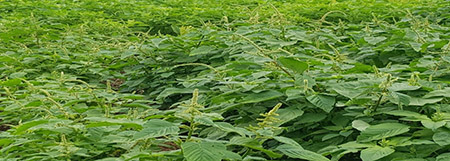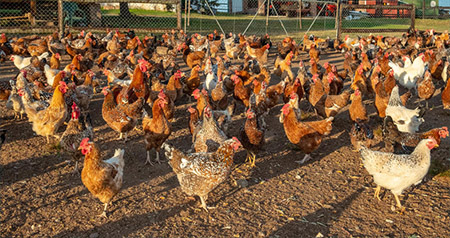To promote mental health and wellbeing and prevent substance abuse among young people in Lokaleng village in Mahikeng, the North-West University’s (NWU’s) Faculty of Natural and Agricultural Sciences will be leading the agricultural intervention section of the multi-sectoral collaborative care community intervention project that will be launched in the village on 15 October 2021.
The subject group Animal Science will promote the production of indigenous chickens to improve household food security, while the Crop Science subject group will promote the cultivation of amaranthus and other indigenous African leafy vegetables. The subject group Agricultural Economics and Extension will in turn teach the local youth marketing and financial management skills.
Indigenous chickens provide a livelihood
Prof Kwena Mokoboki from the School of Agricultural Sciences says that farming with Indigenous chickens can provide these families with a livelihood and therefore contribute to food security.
This resonates with the United Nations Sustainable Developing Goals as framework and lifestyle interventions for rural development, which Prof Ushotanefe Useh, director of the NWU’s Lifestyle Diseases research niche unit, recently did a presentation on.
“Indigenous chicken breeds are well known for their tropical adaptability, resistance to diseases, and plumage colours that help protect them against predators,” adds Prof Mokoboki.
“I believe that the goal of a rural poultry farmer is to have birds that not only lay more eggs with an optimum size, but whose chicks can also grow to an optimum bodyweight. We will therefore be using indigenous breeds for this project, which are often much cheaper to keep.”
Prof Mokoboki says since these chickens live off the land through scavenging, they can thrive with minimum animal healthcare and can produce without regular supply of chicken feed and water. These chickens also often have natural immunity against local diseases.
“Compared to commercial meat chickens, these birds are leaner with more nutrient-dense meat which is tougher because of their outdoor lifestyle and diet. However, the meat is considered tastier and healthier than commercial broiler meat,” she adds.
“Although indigenous chickens have a slow growth rate and are poor layers, they play a major role in the livelihood of poor rural communities, not only by providing nutritious food, but also as subsidiary income,” says Prof Mokoboki.
African leafy vegetables have potential
According to Dr Cornelia Lebopa from the subject group Crop Science, underutilised African leafy vegetables (ALVs) have the potential of solving the problem of household and food and insecurity, which is prevalent in rural parts of the country.
“These ALVs include amaranthus (Amaranthus spp), Cat’s whiskers (Cleome gynandra), blackjack (Bidens pilosa), wild okra (Corchorus olitorius), and nightshade (Solanum retroflexum complex),” she adds.
She says these indigenous vegetables have been reported to be rich in both macro-elements and micronutrients such as zinc, iron and copper, and also metabolites such as nutraceutical compounds and vitamins A and C.
Although the various benefits of underutilised African leafy vegetable species are now well known, there has not been a large scale adoption in terms of cultivation, utilisation, and commercialisation.
“However, the leaf yield of endemic/native ALV species such as Amaranthus greacizans, Amaranthus thurngergii, and Amaranthus hybridus is still very low when compared with commercial leafy vegetables such as cabbage and Swiss chard and other improved amaranthus genotypes from other parts of the world.
“Fortunately these improved genotypes from the World Vegetable Centre are now available in South Africa through a collaborative agreement between the NWU and the Agricultural Research Council of South Africa,” adds Dr Lebopa.
Skills to empower
“Given the impact of the Covid-19 pandemic on the current youth unemployment rate and high food prices, this multi-collaborative agricultural initiative will assist young people in the Lokaleng area to improve their livelihood by farming, while also learning the necessary production and marketing skills,” says Usapfa Luvhengo from the subject group Agricultural Economics and Extension.

Amaranthus (Amaranthus spp) is one of the underutilised African leafy vegetable species.

Indigenous chickens can provide a livelihood and therefore contribute to food security.
